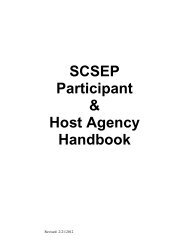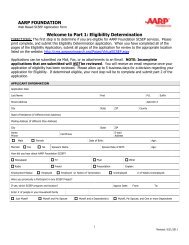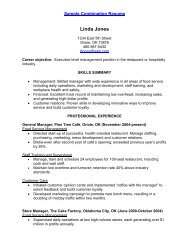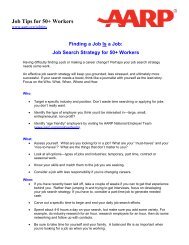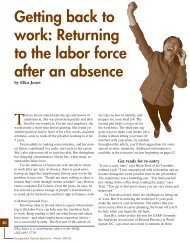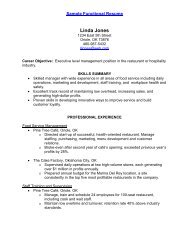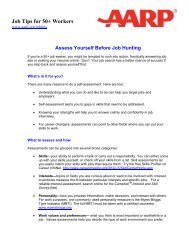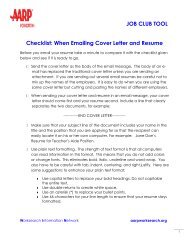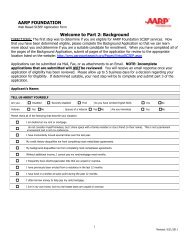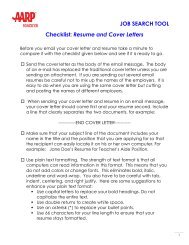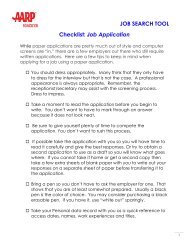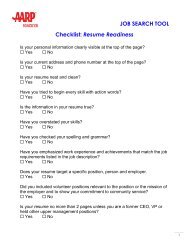JOB SEARCH TOOL Fact Sheet: Networking Tips - AARP WorkSearch
JOB SEARCH TOOL Fact Sheet: Networking Tips - AARP WorkSearch
JOB SEARCH TOOL Fact Sheet: Networking Tips - AARP WorkSearch
You also want an ePaper? Increase the reach of your titles
YUMPU automatically turns print PDFs into web optimized ePapers that Google loves.
<strong>Fact</strong> <strong>Sheet</strong>: <strong>Networking</strong> <strong>Tips</strong><br />
<strong>JOB</strong> <strong>SEARCH</strong> <strong>TOOL</strong><br />
1. Create a list of people using the categories below. To keep track<br />
of the information use the worksheet “Network Contact <strong>Sheet</strong>”.<br />
Remember to make notes about the information that you<br />
uncover during your networking sessions. You will also want to<br />
keep a record of correctly spelled names, titles, phone numbers<br />
and emails, and dates. Start your network by contacting people<br />
in the following categories:<br />
! Alumni<br />
! Acquaintances and friends<br />
! Church members<br />
! Community business people<br />
! Former Classmates and/or college professors<br />
! Former co-workers and/or bosses<br />
! Members of professional or social organizations<br />
! Neighbors<br />
! Politicians<br />
! Relatives<br />
2. Have a clear goal in mind<br />
Whether you’re attending a networking event or making “cold<br />
calls” you must have a clear goal. That goal is your reason for<br />
attending the event or making the call. Suggested Goals:<br />
! To make people aware that you are looking for work<br />
! To find out if the employer of interest has openings?<br />
! To meet someone in particular at the event?<br />
! To meet people in your field of interest?<br />
! To set up an informational interview to find out more about a<br />
particular field or job hunting strategies<br />
! To ask for a job<br />
! Instead of asking for a job, to ask for suggestions about how to<br />
approach your job search<br />
1
3. Use your Elevator Speech<br />
If you’re apprehensive about meeting new people it helps to<br />
prepare an elevator speech An elevator speech is a 30 second<br />
clear, concise and compelling presentation of who you are and<br />
what you do and why anyone should care! Creating an elevator<br />
speech may take several drafts, practice, and time before you<br />
are able to craft a speech that best describes you. Your speech<br />
should answer the questions:<br />
! Who are you?<br />
! What do you do?<br />
! Why should I care? (or WIFM, What’s In It For Me)<br />
Write out your answers to each of the questions making sure that<br />
you cover at least one, but no more than two strengths or<br />
accomplishments total. Edit the answers to make them more<br />
concise. Remember why it is called the elevator speech<br />
because you should be able to present yourself to a prospective<br />
employer in the time it takes to ride the elevator to the next floor.<br />
30 seconds is the recommended amount of time but don’t get<br />
hung up on the time issue if your speech is 25 or 41 seconds long.<br />
The message is the important point. The aim of your elevator<br />
speech is to get your foot in the door by starting a conversation,<br />
and with a bit of luck engage someone enough to want to<br />
continue the conversation with you.<br />
4. Create a list of questions in advance that serve as conversation<br />
starters. The questions should be open ended questions, that<br />
means questions that can’t be answered with a simple yes or no.<br />
Here are some examples:<br />
! What kind of work do you do?<br />
! How long have you been in that field of work, or position?<br />
! How did you get into that field?<br />
! Did you always want to become a _______ ( profession)<br />
! Do some parts of the job come naturally for you?<br />
! What do you like most about your job?<br />
! Do you have a role model or mentor?<br />
2
! Do you see yourself retiring with your current employer?<br />
! Do you see yourself retiring in this field or are you thinking of<br />
trying something different?<br />
! What would you do differently if you had to do it all over<br />
again?<br />
! What do you do in your spare time?<br />
5. Sharpen your listening skills<br />
Successful networking sessions involve listening to what the other<br />
person is saying, regardless of whether or not they are talking<br />
about what is of interest to you. It is not all about you. Listen.<br />
Don’t try to dominate the conversation in order to get the<br />
information you are seeking. Every successful conversation<br />
involves 2 or more people sharing information, asking and<br />
answering questions. Here are a few listening tips:<br />
! Don’t interrupt to make your point. Allow the other person to<br />
finish their thought before responding?<br />
! Listen while the other person is speaking instead of trying to<br />
think of what to say next<br />
! Ask clarifying questions to make sure that you understand<br />
what the person is saying<br />
! Show genuine interest by making eye contact while the<br />
other person is speaking<br />
6. Follow Up<br />
Always follow up with persons of interest within a few days to<br />
continue developing the relationship. A short email or phone call<br />
thanking them for the lead or just thanking them for an enjoyable<br />
conversation should suffice. You may have to reintroduce<br />
yourself and mention how/where you met to jog their memory. If<br />
that person gives you the name of a business associate, ask<br />
permission to use their name when you contact the business<br />
associate, and then follow up as soon as possible.<br />
<strong>Networking</strong> <strong>Tips</strong><br />
3
! If you are attending an event try to start a conversation with<br />
someone who looks friendly or who makes eye contact with you<br />
or who looks as uncomfortable as you do and work from there.<br />
! <strong>Networking</strong> is not about meeting more than one person and then<br />
calling it a day.<br />
! If you are shy or fearful give yourself time after trying it a few times<br />
you will be able to get over your fear of rejection or<br />
embarrassment. The practice will be helpful when you begin<br />
interviewing.<br />
! Begin with people you already know, family, or friends etc.<br />
! Don’t think you will be able to meet the right people, or gather all<br />
of the information you need from a few attempts at networking.<br />
It may take some time but don’t give up.<br />
! It’s unrealistic to think that people will give up valuable names<br />
and information after one conversation with you. You will have to<br />
develop that type of relationship over time.<br />
! Set aside time to network by maybe calling a person each day or<br />
attending an event weekly. As time goes on you will learn which<br />
events are the most profitable and which ones to pass over.<br />
! Not everyone will offer useful information or be willing to help but<br />
don’t let a few rejections stall your progress.<br />
! Don’t think of networking as an inconvenience. It’s well worth the<br />
investment of time to have a strong network to call on throughout<br />
your career. Remember, 80% of most jobs are found through<br />
networking. You do the math!<br />
<strong>Networking</strong> is not…..<br />
! about gathering a lot of business cards. Having a big stack of<br />
business cards in your desk is no prize!<br />
! seeing how many people you can meet. Quality not quantity is<br />
the key. Take time to meet people and get to know them. It’s a<br />
two way street. You may be able to help them in some way.<br />
! begging everyone you meet for a job<br />
! about meeting a bunch of people and calling it a day. It is<br />
about getting to know people in your line of work.<br />
4



